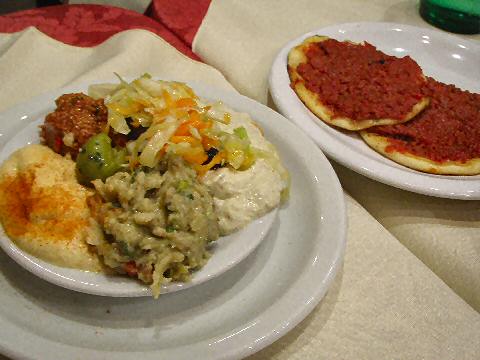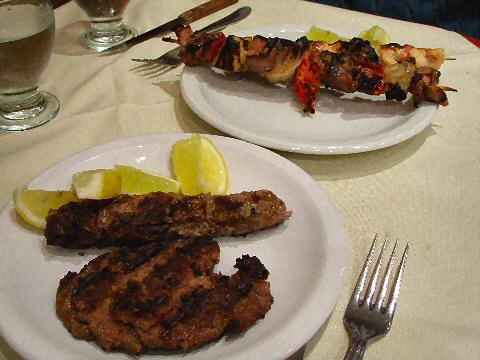“How was my weekend? Meh. The mehness of it is indescribable. Just one big, fat meh. If you are an old-media kind of reader, “meh” won’t mean a whole lot to you. The word has appeared in the national press three times in the past year. If you gain new vocabulary from conversation, it is probably unfamiliar. If you can’t be torn from the web, however, you will almost certainly know it, and its meaning. Meh means rubbish. It means boring. It means not worth the effort, who cares, so-so, whatever. It is the all-purpose dismissive shrug of the blogger and messageboarder. And it is ubiquitous.”
– Michael Hann, The Guardian UK
Buenos Aires – My friend Barbara is on a mission. It has various facets, but among them, and the part that holds most interest for me, is her intent to try out all the kosher (and I suppose non-kosher) Jewish restaurants in Buenos Aires. My feelings about kosher food are mixed – there’s certainly some sort of deep-rooted draw based on cultural heritage, and, depending on whether we’re talking ashkenazi or sephardi, some comfort food warm and fuzzies; but there are also negatives – the non-mixing of meat and milk (from my perspective a complete over-extension of the actual scriptural prohibition), the fact that the meats are generally much drier (both from the method for kosher butchering and the insistence on cooking things until they’re well done or close to it), but most importantly, the lack of creativity. Now, that’s not to say there’s no such thing as a creative kosher chef – in fact, I spent a whole day working with one at Levana in New York many years ago, with an eye towards a sous chef position – but on the whole, kosher restaurants seem far less creative than… well, any other type of restaurant I’ve ever been to. They’re cookie cutter versions of some sort of universal standard – some better, some worse, but all with virtually identical menus (with only the variation of the two cultural branches noted above – respectively, eastern European, and Mediterranean, more or less).

The place is long and narrow and looks, more or less, like a fancied up school cafeteria. No lines to stand in, but it just has that air. We arrive early, only a duo of bearded men in earnest scholarly conversation are present, speaking in a loud mix of Yiddish and Spanish. Over the evening the room fills, with a cacophony of those idioms, plus English and Hebrew. When we ask what an unfamiliar dish is on the menu, rather than simply describe it in Spanish, our waiter insists on sending over some youngster whom he drags out of the kitchen, who offers us English menus, but not a description of the dish. We decline and move on – deciding on a mixed appetizer plate – small size – to share, plus a couple of the open-faced empanadas – this is a sephardi style restaurant. The mixed plate, a train wreck of presentation – with its smoked eggplant mayonnaise (not quite babaganoush with the mayo…), tomato-ey tabouleh, bland hummus, vinegary chambota (olive oil soaked grilled vegetables), and a few desultory olives thrown on for effect. It’s heaped high, and plenty to share, perfectly edible, and completely devoid of interest. The empanadas, the lehem hayim, spark a little more notice, with a sort of barbecue topping that’s actually got some flavor to it.

Sucath David offers little in the way of beverage that might perk up the meal – water, sodas, local beer, and a few over-priced and basically undrinkable wines (and nothing by the glass). The bakhlava for dessert was swimming in rosewater, and could simply have been laid out on a table in place of potpourri. The one possible final glimmer of hope, the offering of traditional Turkish coffee, is only a vestige on the menu of times gone by – all that is available is “regular”.
So, meh. It wasn’t horrible. It wasn’t wonderful. It was pretty much what I’d expect, and probably meets the expectations of the average kosher diner. Still, wouldn’t it be exciting to find a kosher restaurant where they actually cared about the food?
[…] to research the various kosher restaurants here in Buenos Aires. I also mentioned the utter “meh-ness” of most of them (both here and elsewhere) that I’ve experienced. So though I’m […]
[…] public links >> meh I haz Ponyz insidez meh! First saved by mecredy | 1 days ago Meh First saved by omegaminus | 1 days ago Does anyone know where blogroll has gone? First saved […]